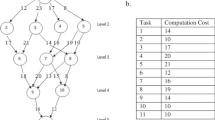Abstract
The multiprocessor scheduling problem is one of the classic examples of NP-hard combinatorial optimization problems. Several polynomial time optimization algorithms have been proposed for approximating the multiprocessor scheduling problem. In this paper, we suggest a geneticizedknowledge genetic algorithm (gkGA) as an efficient heuristic approach for solving the multiprocessor scheduling and other combinatorial optimization problems. The basic idea behind the gkGA approach is that knowledge of the heuristics to be used in the GA is also geneticized alongiside the genetic chromosomes. We start by providing four conversion schemes based on heuristics for converting chromosomes into priority lists. Through experimental evaluation, we observe that the performance of our GA based on each of these schemes is instance-dependent. However, if we simultaneously incorporate these schemes into our GA through the gkGA approach, simulation results show that the approach is not problem-dependent, and that the approach outperforms that of the previous GA. We also show the effectiveness of the gkGA approach compared with other conventional schemes through experimental evaluation.
Similar content being viewed by others
References
Kasahara H (1991) Parallel processing technology (in Japanese). Corona, Tokyo
Garey MR, Johnson DS (1979) Computers and intractability. A guide to the theory of NP-completeness. Freeman, San Francisco
Lenstra JK, Kan AHGR (1978) Complexity of scheduling under precedence constraints. Opertions Res 26:22–35
Coffman EG (1976) Computer and job shop scheduling theory. Wiley
Gonzalez MJ (1977) Deterministic processor scheduling. Comput Surveys 9:173–204.
Ibaraki T (1995) Combinatorial optimization and scheduling problems: new algorithms and their perspective (in Japanese). J Soc Instrum Control Eng 34:340–346.
Kasahara H, Narita S (1984) Practical multiprocessing scheduling algorithms for efficient parallel processing. IEEE Trans Comput C-33:1023–1029
Nakasumi M (1994) A process scheduling by parallel genetic algorithm. Proceedings of the Fifth Meeting of the Special Interest Group on Parallel Processing for Artificial Intelligence (in Japanese), pp 1–4
Davis L (1991) Handbook of genetic algorithms. Van Nostrand Reinhold, New York
Goldenberg DE (1989) Genetic algorithms in search, optimization, and machine learning. Addison-Wesley, Reading
Ombuki B, Nakamura M, Onaga K (1997) A hybridized GA approach to the job shop problem. Proceedings of the International Technical Conference on Circuits/Systems, Computers and Communications. ITC-CSSS '97, vol 1, pp 483–486
Tamaki H (1995) Combinatorial optimization by genetic algorithms (in Japanese). J Soc Instrum Control Eng 34:347–352
Author information
Authors and Affiliations
About this article
Cite this article
Nakamura, M., Ombuki, B.M., Shimabukuro, K. et al. A new hybrid GA solution to combinatorial optimization problems— an application to the multiprocessor scheduling problem. Artificial Life and Robotics 2, 74–79 (1998). https://doi.org/10.1007/BF02471158
Received:
Accepted:
Issue Date:
DOI: https://doi.org/10.1007/BF02471158




